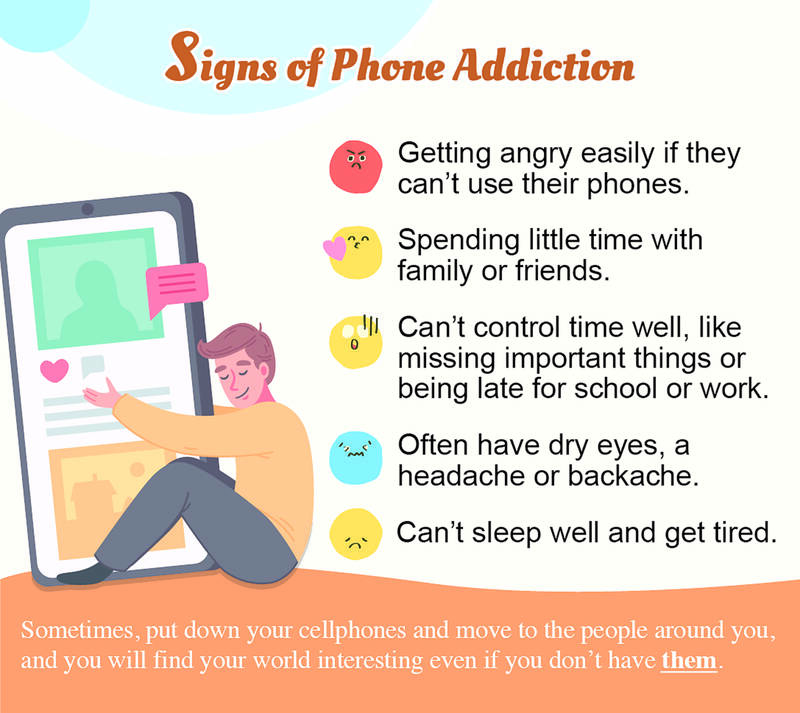The following picture shows some signs of phone addiction. Please check them and think what you can do to get away from it.
Signs of Phone Addiction
Getting angry easily if they can’t use their phones.

Spending little time with family or friends.
Can’t control time well, like missing important things or being late for school or work.
Often have dry eyes, a headache or backache.
Can’t sleep well and get tired.
Sometimes, put down your cellphones and move to the people around you, and you will find your world interesting even if you don’t have them.
必備單字
1. sign v. 簽字、做記號
n. 記號、跡象、徵兆(國中基礎1200字)
2. interesting adj. 有趣的(國中基礎1200字)
實用字詞
1. phub v. 低頭滑手機、不顧他人的動作
(phone電話+snub冷落)
phubber n. 低頭族
2. scroll v. 上下滑手機(滾動頁面)
swipe v. 左右滑手機(轉換頁面)
解題技巧:判斷代名詞題型
代名詞用來代替前述說過的名詞,可以先還原為原名詞後再檢視內容,例如:Sometimes, put down your cellphones and move to the people around you, and you will find your world interesting even if you don’t have them. (= cellphones)
換你練習看看:
The following picture shows some signs of phone addiction. Please check them and think what you can do to get away from it.
這兩個代名詞分別指的是…?
解答:
them = signs of phone addiction
it = phone addiction
考題練習:
TOEIC Bridge測驗 X 國中會考題型
1. According to the reading, who may have “phone addiction?”
(A) Cathy always fights with her mom because her mom takes her cellphone away.
(B) Job seldom has time to talk to his friends on the phone.
(C) Lily has a headache and can’t sleep well, so she goes to the doctor for help.
(D) Tommy enjoys sharing fun YouTube videos with his friends.
2. What does “them” in the last paragraph mean?
(A) games
(B) people
(C) signs of phone addictions
(D) cellphones
解答:
1. (A) 2. (D)
文章由TOEIC Program Taiwan · Chun Shin提供:
www.facebook.com/ToeicProgramTaiwan

In the digital age, where communication revolves around text messages, “telephone phobia” (also known as “telephobia”) has become increasingly common, especially among young adults. Despite the ubiquity of smartphones, a significant number of individuals experience anxiety when __1__ making or receiving a phone call. Telephobia, in essence, is a fear or reluctance related to speaking on the phone. __2__ other communication methods, phone conversations require spontaneous responses and lack visual feedback such as body language and facial expressions. In such a real-time situation, telephobia sufferers are concerned about their inability to respond or express themselves appropriately, which can lead

A: Apart from singer Daniel Kang, more South Korean stars are coming to Taiwan in March. B: Really? Like who? A: Taeyeon of Girls’ Generation will hold a concert at the Taipei Dome on March 16. B: So she’ll set a milestone by becoming the first K-pop artist to stage a show at the venue. A: Singer Lee Mu-jin, boy group NCT 127 and girl group GFRIEND are also visiting Taiwan. I can’t wait. A: 除了姜丹尼爾,3月有不少韓星訪台。 B: 真的嗎?有誰啊? A: 像是少女時代的太妍,3月16日即將唱進大巨蛋。 B: 成為首位破蛋的韓流歌手,這可真是一項里程碑! A: 歌手李茂珍、男團NCT 127、女團GFRIEND 3月也要來,真是令人期待。 (By Eddy Chang, Taipei Times/台北時報張迪)

>> Bilingual Story is a fictionalized account 雙語故事部分內容純屬虛構

本文由生成式 AI 協作,本刊編輯編修 Striking a balance between taste and health can be difficult, especially for those who appreciate Asian food. Many Asian dishes are high in sodium, which can be harmful to health, including increasing the risk of hypertension and stroke. In Japan, this problem is especially severe, with the average adult __1__ about 10 grams of salt per day, double the amount recommended by the World Health Organization. While many people seek healthier choices, __2__ salt can often leave food tasting bland, which makes low-sodium diets difficult to maintain. A Japanese compa ny has developed a __3__ utensil that makes